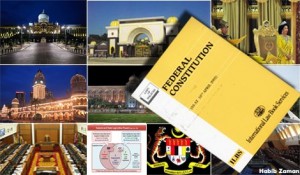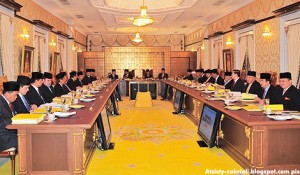-K.J.John, July 22, 2014.
 As a Malaysian citizen I have no problem accepting and agreeing that we need traditional rulers, we call ‘sultans;’ to help moderate issues and concerns of the peoples of Malaysia. Nonetheless, I have serious problems and issues with sultans who ignore the real needs of people but support the power-brokers around the palace; as if they have more rights than other equally legitimate citizens.
As a Malaysian citizen I have no problem accepting and agreeing that we need traditional rulers, we call ‘sultans;’ to help moderate issues and concerns of the peoples of Malaysia. Nonetheless, I have serious problems and issues with sultans who ignore the real needs of people but support the power-brokers around the palace; as if they have more rights than other equally legitimate citizens.
All sultans need to understand that we are a constitutional monarchy; not just a traditional one. Therefore the federal constitution defines what are the roles of the rulers and the limits of their authority and power.
I therefore write this ‘bitter truth’ column to explicate and clarify our understanding about who is the Conference of Rulers and what is the real history of the nine sultans of Malaya.
Conference of Rulers and what is the real history of the nine sultans of Malaya.
The eight sultans and one Yang di-Pertuan Besar are so-called hereditary rulers of the nine states of Malaya. However, in both Negri Sembilan and Perak, they have more than one ruling family of hereditary rulers, and one of these hereditary ruler families is selected to assume the role of ruler.
While the 9th state still follows this tradition, I really and frankly do not understand why Perak chose to abandon their hereditary family rotation history. Maybe the scholars of local royal history can tell me why.
In Negri Sembilan the current Yang di-Pertuan Besar is from a different hereditary family than the last one. One of the sons, Tunku Abidin Muhriz, is now a friend as much as one of the other family’s sons was our family friend as well. I also have friends from the other Perak families but have never asked why they were dislocated.
Mais and Jais
Dr Abdul Aziz Bari is a good friend and a legal authority on the federal constitution. He currently lectures with the University of Selangor or Unisel. V Ambalagan was a former general-secretary of the journalists union and has since retired and is now is specialist writer with The Malaysian Insider. He filed the report below:
Problems will arise if the Selangor Islamic Affairs Council (Mais) is given immunity and treated as the alter ego of the state ruler, says a constitutional expert.
“As such, Mais must make sure that it does not do anything that will bring disrepute to the sultan’s image as head of state,” said lecturer Dr Abdul Aziz Bari.
He said to assume that Mais spoke and acted on behalf of the sultan would lead to difficulties and problems, adding that there could not be more than one ruler in the state.
Aziz said Mais was created to assist the sultan in his role as the head of Islam, as spelt out in the state constitution.
“But the problem starts when Mais is formally created as a statutory body through a law passed by the state legislative assembly. It is a legal entity in its own right. It can sue and be sued,” he told The Malaysian Insider.
He was referring to Selangor’s Sultan Sharafuddin Idris Shah, who yesterday voiced displeasure with a PAS lawmaker for questioning Mais’s executive powers and suggesting they be withdrawn.
I cannot agree more with Ambalagan and Dr Aziz Bari. More importantly I have an even more serious legal question to frame. Was the Selangor government enactment not against the federal constitution? Why do I raise this issue and concern?
Basically our constitution is the framework law that constitutes us, or forms and frames our mutual relationships. If there is no constitution we will break up and have no organising structure for the Federation of Malaysia. The ‘we’ are all ‘states;’ the Borneo ones, as counterparts of Malaya, and also the 11 states that make up peninsular Malaya.
The ‘we’ also includes all other institutions created by the constitution; which includes the Conference of Rulers, the institution of the Parliament and State Senates, the Judiciary, and even the Executive. The ‘we’ also includes all of us ordinary citizens who depend on the constitution to protect and preserve our basic human rights as guaranteed by the United Nations of the world.
Senates, the Judiciary, and even the Executive. The ‘we’ also includes all of us ordinary citizens who depend on the constitution to protect and preserve our basic human rights as guaranteed by the United Nations of the world.
Therefore, if our constituent institutions do not respect our federal constitution and her framing structure, we are doomed to break up at least into three parts if not also into many more.
Our framing structure
As an organisational theorist, I always look at underlying assumptions and belief structures to define any reality. The Federation of Malaysia is no different, and much of the essence of our framing structure issues and concerns are captured by both the Reid and Cobbold Commissions. Both these were moderated by the United Kingdom as part and parcel of the Commonwealth of Nations.
Some of those guiding assumptions were that the four colonies of Britain; namely, Singapore, Malaya and the two Borneo states of Sabah and Sarawak were desirous of coming together to make a new Federation called ‘Malaysia.’ That Federation of Malaysia was birthed on Sept 16, 1963. Then, as history records it, Singapore left that federation and became independent in 1965.
Under these framing structures were some hierarchy of realities and I have written about this before but obviously Mais, the Selangor Islamic Affairs Department (Jais), and the sultan of Selangor did not read or appreciate that reality.
We are a federation and that framing structure exists as our highest level of material reality but that structure does not afford us 13 states but really only three states which form the federation. The foundation document for that reality is the constitution and in it the constitution self-declares that it is the supreme law of that federation. What does that mean?
Frankly and in reality, it means, the federal constitution and not even God, or any other external body, including the UN, can redefine our constitutionally ordained reality. Even the Conference of Rulers cannot do it, by themselves save for abiding with due process already provided for by the constitution.
When the Selangor state, under the former government, ‘created Mais’ under a pretentious absolute authority and gave them powers in public space morality, they were clearly unconstitutional. I have called this ‘the reality of breathing green air’, but by deploying the Islamic interpretations of the Syariah.
They cannot and do not have such absolute power to do so, as it was never granted by the constitution. Therefore Mais and Jais are out of their jurisdiction.
Mais or really Jais’ executive authority in the public spaces of life is consequentially an illegal authority which was assumed while the governance agencies of the day fell asleep. Therefore, all sultans should be more cautious in their interpretation of what is right and good and true in their states, as their institutional portfolio, too, is qualified by the same federal constitution.
——————————————————————————————————————————————————————————————-
KJ JOHN was in public service for 29 years. The views expressed here are his personal views and not those of any institution he is involved with. Write to him at [email protected] with any feedback or views.
























